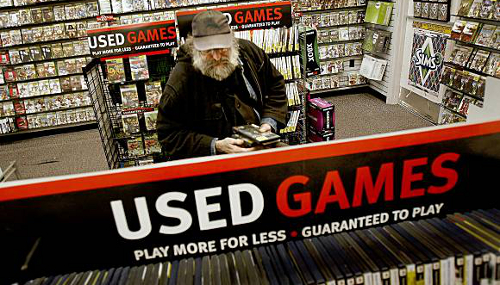Evaluating the Potential of Used Games Being Blocked on New Consoles

Rumors of technology being implemented in consoles to block used games are nothing new. In the lead-up to the Xbox 360 and PS3 there were rumblings that were unsubstantiated and now they’ve surfaced again. The latest unverified reports, which focus on the next Xbox though similar news earlier related to the PS4, are harder to ignore given the push towards a digital future and the restrictiveness that has been escalating throughout the current generation.
The most recent uproar originates from Edge’s report on information collected from sources which features details such as the console being “always online”, using large Blu-ray discs, coming with Kinect 2.0, and most notably blocking any games from being played that aren’t brand new and tied to the user’s account. Microsoft has not acknowledged the rumors though it is their policy not to do so.
In general terms taking that anti-consumer action would appear to be a monumental mistake. It may immediately please developers, who have turned to “Online Passes” to try and account for what they deem to be sales lost to the secondhand market, but the widespread perception of the console would take a significant hit.
It is almost certain that it will be both Sony and Microsoft going this route or neither will. Being isolated as the only console where games can’t be played unless they were bought new would push consumers to the competitor. Third party developers would follow as they would be putting their titles out on one system where used games would be blocked and the other where they would not be. Retailers like Gamestop would shift their efforts to supporting the more open console. The damage done to the one restrictive console would be devastating. Retailers and consumers would be forced to adapt if both did it however with the former likely offering more in the way of bonuses to fight digital sales and the latter buying fewer games.
Personally not having the ability to utilize a secondhand market would greatly affect purchase decisions. Any games that I found myself at all on the fence about would be passed over knowing that they could not be sold to recoup some of the costs involved if they didn’t pan out as hoped. Certainly if the two consoles went opposite directions I would be buying every third party title on the one that remained open. Consumers don’t have to actively buy used games to be affected in this. Not having the ability to rent or borrow games to try them out would affect many other people as well. A shift in such a direction would also only serve to strengthen the development trend towards mostly big budget AAA titles and shrink market options.
Sports franchises however are in a unique position releasing yearly on very specific cycles. League licensed products are especially front-loaded because their relevance is limited to the seasons on which they are based. Publishers have further accelerated early sales of new copies by introducing the “Online Pass” (reducing the value of used) and pushing pre-order incentives. They’ve attempted to provide reasons to hang on to the titles longer as well through DLC and modes like Ultimate Team. The windows for relevancy and subsequently value are very slim. Therefore a decision to block used games would be less damaging to the sports franchises than it would with other genres.
The more likely outcome of all this may be something along the lines of a universal “Online Pass” built in to the consoles with this more drastic rumor being floated to soften the blow of a later reveal. In fact many would probably be thankful that used games weren’t being blocked completely when, if no one had known about that possibility to being with, they instead would have been very upset about that now perceived middle-ground being introduced.
With the current state of sports gaming a move towards preventing any secondhand games market would likely not have a huge affect on the outlook of major franchises going forward. The contraction over the course of the last nine years means there are very few fringe titles, which rely more on word of mouth that would be limited by such a tactic, that would be threatened. It would have a drastic influence however on the industry as a whole. There is no reason to panic right now – certainly a denial by Microsoft would be welcome – but should it actually materialize the widespread ramifications will be dramatic.
